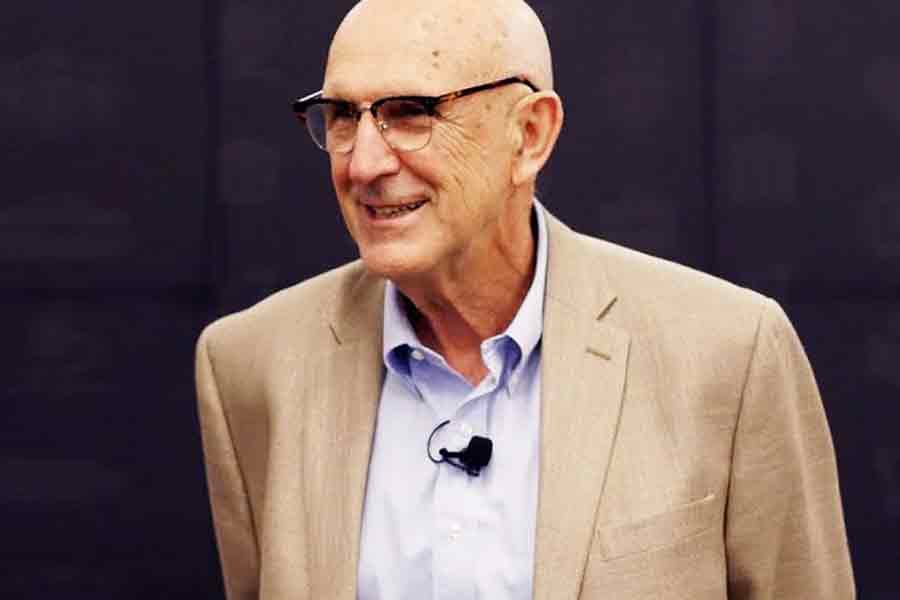Robert E. Quinn, professor emeritus at the University of Michigan and the Ross School of Business, highlighted the importance of purpose in companies for tackling crises.
During his talk at the Wellbeing 360 event, organized by Tecmilenio, Quinn said that organizations in which leadership promotes purpose not only survive crises but also show growth.
“The primary goal of a leader is to constantly clarify the purpose (of the organization). It’s what unites people and encourages them give their best,” he said.
During his talk, the professor emeritus shared some examples of leadership, purpose, ideas, and some ideas and advice to help organizations in times of crisis.

Leadership and purpose: a formula for success
Quinn explained that in every organization, people face problems and personal interests that can sometimes affect organizational success, causing various challenges and even massive losses.
That’s why he highlighted the importance of creating organizations and companies with a purpose, beyond mere profitability.
“What unites people and drives them to high performance is the constant awareness that there is a greater purpose, and that leadership is genuinely committed to it,” he said.
Quinn shared four questions leaders need to ask themselves so they can positively influence their organization and lean on purpose to create organizational excellence:
What results do I want to have? Robert explains that the answer to this first question must have a purpose, a motive, and something that guides the actions of a leader.
“What unites people and drives them to high performance is the constant awareness that there is a greater purpose.”
For the second question, Robert advised questioning whether external factors are controlling the leader. This means if their actions are only intended to please the boss or their direct reports.
“Am I being guided by my inner values? Am I authentic about purpose? Everyone notices when someone is hypocritical and everyone notices when they are authentic,” he added.
The third question is based on leaders questioning the possibility of understanding the needs and interests of people within the organization.
He says it’s easier to inspire people to do something by showing empathy rather than forcing them.
The fourth and last question that the professor raised is whether as a leader you are able to create a safe space so that other people can say what they really think and believe.
“Answering the first question gives you intention, the second gives you authenticity, the third gives you empathy, and the last humility.
“In other words, your virtue as a leader increases, and even makes other people want to be like you. These four questions can be applied to transform any crisis situation into a proactive opportunity,” he said.

Why are there more bosses than leaders?
Robert continues his talk by mentioning Maria, a woman from a company in South America who came to the conclusion that there are three types of executive groups in an organization.
The first and smallest group consists of leaders who inspire not only those they lead but also other executives and people in general.
The second and largest group of the three consists of administrators or managers, who intellectually understand leadership, but don’t practice it.
The third and last group is a small group that includes the technicians, who may never be able to understand leadership.
“For years, I went to organizations and saw what Maria described. I started asking groups of executives why the middle group was the largest.
“Executives live in fear. We think they’re full of confidence, but sometimes they don’t have the skills to make changes and they’re punished if they fail,” Robert said.
The professor said that other factors in addition to fear prevent leadership development in an organization, such as fatigue from working shifts of up to sometimes 12 hours.
Another factor is a culture that encourages more competition than cooperation in an organization, which affects leadership development.
“Sometimes, bosses ask executives to be leaders, but then they behave in way that doesn’t enable them to lead or allow them to talk about it.
“So, a lot of highly paid executives are just managers who are very unlikely to become leaders,” he said.

How can you become a leader? A crisis could help
During his talk, Quinn pointed out that crises are an opportunity to foster leadership.
He shared the example of Gerry Anderson, CEO of an energy company called DTE Energy that was faced with the decision to lay off people in the 2008 economic crisis.
“Gerry made the difficult decision to talk to his company about it. I say it was difficult because it’s painful when a CEO doesn’t know what to do when they are supposed to.
“Gerry decided to tell them the truth. He talked to company executives, showed them the numbers, and asked them to help him look at options to avoid laying off staff,” Quinn said.
Robert said that a leader must speak the truth and even ask for help and consider the ideas of the members of their organization.
By the following year, while General Motors and other companies were going bankrupt, DTE Energy had managed to save three million dollars on just one project and was even showing an increase in numbers.
“The question that changed everything was ‘Can we develop organizational excellence through a crisis without leadership?’
“‘Can we develop organizational excellence with leadership, but without a crisis?’ That was the question Gerry Anderson asked himself. I don’t think so,” Quinn concluded.

Who is Robert Quinn?
Quinn is one of the co-founders of the field of Positive Organizational Scholarship and the Ross Center for Positive Organizations.
He has published 18 books and is in the top 1% of professors most cited in organizational behavior textbooks.
Quinn has received multiple awards as a professor. In a global survey, he was named one of the world’s best speakers on organizational culture and related issues. His talk on personal purpose went viral and has been viewed by more than 16 million people.
Wellbeing 360
The Wellbeing 360 event, organized by Tecmilenio, brings together leaders in Wellbeing Science who share their ideas on organizations, families, education, life with a purpose, and wellbeing in cities.
This event was held from October 17 to 20, 2022.
“TecMilenio created this forum with the goal of getting thousands of people together with experts from around the world to explore ways to connect with their conscience, create their purpose, live in wellbeing, and aim for self-realization,” said Bruno Zepeda, rector of this university.
“We’re celebrating 10 years of holding this event, which has had different names such as the International Forum of Happiness Sciences and is today Wellbeing 360 for the third year,” said Rosalinda Ballesteros, director of the Institute of Wellbeing and Happiness Sciences.
“We’re very proud that this is probably the most important event on global wellness issues and that it was created by Tecmilenio,” she added.
Wellbeing 360 will feature international experts such as Raj Raghunathan, Kelly McGonigal, Robert Quinn, and Karen Reivich, among others.
READ MORE:





